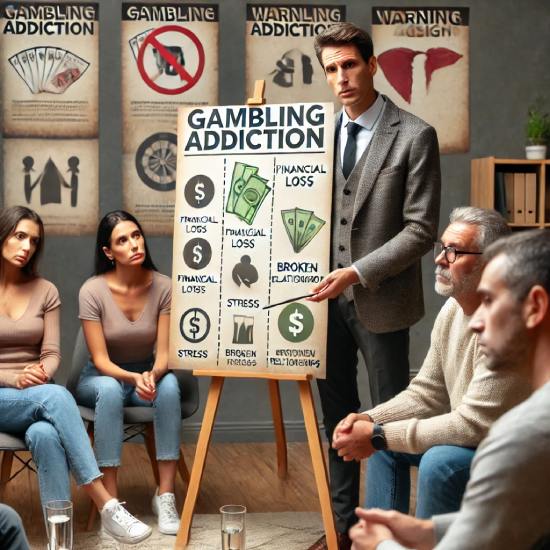
The glitz of a casino promises excitement, escape, and—if luck holds—a life-changing win. Yet for a significant minority of players, the promise turns into a relentless chase that drains savings, strains relationships, and clouds mental health. When late-night spins, stealthy ATM withdrawals, and desperate “one more hand” bargains replace entertainment with obsession, casino gambling addiction has taken root. This comprehensive guide unpacks how casino games hijack the brain’s reward system, who sits in the highest-risk seats, how to spot the slide from recreation to disorder, and—most importantly—evidence-based avenues to reclaim control and rebuild a flourishing life.
Table of Contents
- Global Footprint and Player Demographics
- Underlying Mechanisms and Susceptibility Factors
- Behavioral Cues, Clinical Markers, and Diagnostic Process
- Physical, Emotional, and Social Repercussions
- Evidence-Based Interventions and Sustainable Recovery
- FAQ
Global Footprint and Player Demographics
Commercial casinos now span every continent except Antarctica, generating well over half a trillion U.S. dollars annually. Las Vegas and Macau headline revenues, yet Europe’s Monte-Carlo, Australia’s Crown, and burgeoning integrated resorts across Africa and Latin America cement casino gambling as a truly global enterprise. Within this sprawling market, slot machines (electronic gaming machines, or EGMs) dominate revenue—often exceeding table games and sports betting combined—thanks to constant availability and high spin frequency. Online live-dealer tables and mobile “social casinos” further blur lines between physical and virtual venues, allowing play in airports, lunchrooms, and bedrooms worldwide.
Prevalence studies indicate roughly 1 %–2 % of the adult population meet diagnostic criteria for gambling disorder at any given time, with an additional 2 %–4 % classified as problem gamblers. These rates spike in jurisdictions dense with venues: up to 6 % in some Australian states and 5 %–7 % in certain Native American reservation regions where casino employment is common. Age distribution reveals a U-shaped curve—young adults (18–29) and retirees (60+) both show elevated risk, albeit for different reasons: the former driven by novelty seeking and digital familiarity, the latter by loneliness and fixed incomes.
Gender gaps are narrowing. Historically, men outnumbered women among casino addicts 3-to-1, but aggressive marketing of low-denomination slots, bingo-themed EGMs, and stylish resort-spa packages has lured more women onto casino floors. Ethnic disparities also surface: studies in the United States and Canada show Indigenous and Asian communities bearing disproportionately higher gambling harms, linked to cultural practices, migration stress, or targeted advertising. Beyond ethnicity, socio-economic status plays a paradoxical role—higher-income patrons gamble larger sums per session, yet lower-income groups sacrifice a greater share of household budgets, magnifying harm and perpetuating financial instability.
COVID-19 reshaped the landscape. Brick-and-mortar closures forced players online, where round-the-clock access and digital payment methods accelerated loss patterns. Post-pandemic reopenings then produced a “revenge spending” surge, with casino revenues in 2023 exceeding pre-2020 peaks. Regulators scramble to track this whiplash: some jurisdictions mandate real-time loss limits and mandatory breaks, while others rely on self-exclusion lists that only the self-aware will join. Understanding these macro trends equips clinicians, policymakers, and families to anticipate hotspots and tailor prevention where it counts most.
Underlying Mechanisms and Susceptibility Factors
Casino addiction is not merely a failure of willpower; it is the predictable outcome of powerful behavioral design intersecting with human neurobiology and life context. Three intertwined engines drive susceptibility: game architecture, brain chemistry, and personal environment.
Game Architecture: Built-In Hooks
- Intermittent reinforcement: Slot machines dish out payouts on variable schedules, the same learning principle that keeps laboratory rats pressing levers. Unpredictable wins fire dopamine spikes far more potently than predictable ones.
- Near-miss effect: Reels land just above the jackpot line; roulette balls rattle in the slot next to your number. Near wins activate reward circuitry almost as strongly as actual wins, tricking the brain into “almost had it” persistence.
- Losses disguised as wins (LDWs): Flashing lights celebrate a five-credit payout even when the spin cost ten—creating emotional euphoria despite net loss.
- Rapid cycle time: Modern EGMs allow up to 1,200 spins per hour; even conservative table games like baccarat shuffle every 45 seconds with continuous dealing shoes.
- Cashless play: Ticket-in/ticket-out systems and digital wallets detach spending from the tactile feel of money, dulling loss aversion.
Neurobiological Drivers
- Dopamine dysregulation: Gamblers experience surges comparable to cocaine users during high-arousal bets. Over time, baseline dopamine drops, prompting larger wagers for the same thrill—a tolerance process analogous to substance addictions.
- Prefrontal cortex hypoactivity: Impaired executive control hampers risk assessment and planning, particularly in people with ADHD or history of traumatic brain injury.
- Genetic polymorphisms: Variants of DRD2, COMT, and 5-HTTLPR genes modulate reward sensation and impulsivity, tilting vulnerability toward compulsive betting.
Psychological and Environmental Catalysts
- Early big win: A large jackpot early in a gambling “career” conditions unrealistic expectancy of repeating that outcome.
- Life stress and trauma: Veterans, disaster survivors, or individuals facing divorce may chase gambling’s dissociative trance to escape intrusive memories or emotional pain.
- Loneliness and social reward: Casinos partially meet belonging needs—complimentary drinks, loyalty cards, and dealer banter simulate community.
- Cultural normalization: Family trips to casinos or work conferences at resort properties can frame gambling as harmless leisure, masking danger signs.
- Comorbid addictions: Nicotine, alcohol, and stimulant use heighten gambling sessions’ length and spending; combined cues cross-prime cravings.
These factors rarely operate in isolation. A genetically impulsive person under financial strain, offered free drinks amid flashing LDWs, sits at ground zero for addiction—clear evidence that prevention must address both individual and systemic levers.
Behavioral Cues, Clinical Markers, and Diagnostic Process
Gambling disorder often hides behind polite smiles and digital bank statements until crisis strikes. Recognizing subtle and overt signs accelerates intervention and minimizes collateral damage.
Everyday Red Flags
- Increased secrecy: deleted banking alerts, multiple e-wallet apps, or vague explanations for late nights.
- Chasing losses: returning to the casino the next day to recoup money rather than enjoy entertainment.
- Emotional volatility tied to outcomes: euphoria after wins, irritability or withdrawal after losses.
- Escalating stakes: moving from penny slots to high-limit rooms within months.
- Borrowing or selling assets: pawning electronics, taking salary advances, or maxing credit cards.
Withdrawal-Like Symptoms
- Restlessness and agitation when unable to gamble.
- Persistent preoccupation with betting strategies or recent results.
- Sleep disruption due to late-night online sessions or ruminating over debts.
- Poor appetite or gastrointestinal distress preceding casino visits.
Diagnostic Tools
- DSM-5 Criteria: Meeting at least four of nine criteria (e.g., tolerance, loss of control, jeopardized relationships) within 12 months indicates gambling disorder.
- PGSI (Problem Gambling Severity Index): Nine-item scale; scores 8+ denote problem gambling.
- NODS (NORC Diagnostic Screen): Ten yes/no items align closely with DSM-IV criteria; useful for rapid clinical assessments.
- Financial audits: Reviewing bank statements, credit reports, and loan records quantifies harm and guides debt-management plans.
- Collateral interviews: Input from spouses or close friends often uncovers patterns the gambler underreports.
Clinicians pair these tools with mental-health screenings for depression, anxiety, or substance misuse that may drive or amplify gambling behavior. A holistic assessment prevents piecemeal treatments that miss root causes.
Physical, Emotional, and Social Repercussions
Casino addiction’s toll reaches far beyond empty wallets—it infiltrates health, relationships, and community stability.
Physical Health Concerns
- Cardiovascular strain: Marathon sessions raise blood pressure and heart rate; adrenaline spikes compounded by alcohol and cigarettes heighten stroke and heart-attack risk.
- Musculoskeletal pain: Hours of seated play cause neck, back, and repetitive-strain ailments, worsened by dehydration and poor nutrition.
- Sleep deprivation: Windowless casino floors and blue-light digital displays distort circadian rhythms, leading to fatigue-related illnesses.
Mental-Health Fallout
- Depression and hopelessness: Mounting debts and guilt fuel low mood and suicidal ideation; up to 20 % of pathological gamblers attempt suicide.
- Anxiety disorders: Constant worry over finances, potential discovery, or credit-card fraud suits fosters chronic anxiety.
- Impaired cognition: Brain imaging shows reduced gray matter in reward-processing areas among long-term gamblers, correlating with decision-making deficits.
Relationship and Occupational Damage
- Betrayal trauma: partners feel deceived by hidden debts and broken promises.
- Parenting neglect: focus shifts from family activities to casino visits or online tournaments.
- Job instability: missed shifts, embezzlement, or misuse of company funds jeopardize employment.
- Legal fallout: fraud, theft, or bankruptcy proceedings strain reputations and future earning potential.
Community-Level Impacts
- Increased demand on social services: housing aid, food banks, and credit counseling.
- Crime spikes: robbery and white-collar crimes correlate with casino proximity.
- Economic drain: money funneled into casinos exits local retail and savings pools, dampening economic resilience.
These cascading harms highlight why early identification and comprehensive treatment pay dividends not just for individuals but for families, employers, and entire municipalities.
Evidence-Based Interventions and Sustainable Recovery
While casino addiction can feel inescapable, decades of research offer a toolkit of therapies, medications, and self-help strategies with proven efficacy. Recovery often unfolds in stages: acute stabilization, skill acquisition, consolidation, and long-term maintenance.
Psychotherapies That Work
- Cognitive-Behavioral Therapy (CBT): Gold-standard 12- to 20-session protocols identify cognitive distortions (“I’m due for a win”) and build relapse-prevention skills such as urge surfing and financial blocking.
- Motivational Interviewing (MI): Two- to four-session intervention enhances readiness to change by resolving ambivalence and aligning gambling reduction with core values.
- Exposure and Response Prevention: Gradual exposure to casino cues while resisting betting dampens conditioned arousal, rewiring cue-response loops.
- Couples or Family Therapy: Restores communication, sets joint financial plans, and repairs trust; particularly vital when partners control household income.
Pharmacological Adjuncts
- Naltrexone: Opioid antagonist reduces reward cravings; 50 mg daily outperforms placebo in multiple RCTs.
- SSRIs (e.g., Sertraline, Paroxetine): Address comorbid depression and impulsivity; efficacy improves when combined with CBT.
- Glutamatergic agents (e.g., N-acetylcysteine): Early data suggest decreased urges by modulating glutamate homeostasis in the nucleus accumbens.
- Topiramate: Anti-seizure medication may curb excitement-seeking and aggressive behavior, though side-effects require monitoring.
Digital and Structural Aids
- Self-exclusion programs: Voluntarily ban entry to casinos; facial-recognition updates increase compliance.
- Financial blocking: Bank apps and credit-card companies now allow voluntary gambling transaction blocks.
- Real-time spend trackers: Casino loyalty cards linked to smartphone dashboards display session wins/losses honestly, cutting illusion of control.
- Geo-fencing apps: Alert supporters when a user nears casino geolocations, triggering accountability calls.
Peer and Community Supports
- Gamblers Anonymous (GA): Twelve-step fellowship with sponsorship and structured step work; effective when attended at least weekly for six months.
- SMART Recovery: Secular, science-based meetings teaching CBT skills and motivational enhancement.
- Financial literacy workshops: Debt snowball plans, negotiation with creditors, and rebuilding credit scores reduce relapse triggers tied to financial panic.
- Occupational retraining: For gamblers whose careers collapsed, vocational programs restore purpose and income stability.
Day-to-Day Coping Tactics
- Delay the bet: Commit to waiting 20 minutes before any wager; cravings usually peak and fade within that window.
- Carry cash only: Leave cards at home; predetermined cash limits create a hard stop.
- Swap stimulation: Replace casino lights with high-intensity interval training, dance classes, or VR gaming—activities that boost dopamine without financial risk.
- Mindful breathing drill: Box-breathing (4-4-4-4) calms sympathetic arousal triggered by casino ads or jingles.
- Celebrate milestones: Token rewards at 30, 90, and 180 days gamble-free reinforce new neural pathways.
Relapse-Prevention Blueprint
- Draft a written crisis plan with call list, financial safeguard steps, and motivational reminders.
- Schedule booster therapy sessions monthly for the first year post-abstinence.
- Conduct quarterly financial audits to catch subtle creep of risk-taking (e.g., lottery tickets).
- Develop Purpose 2.0—hobbies, volunteering, or entrepreneurship projects that satisfy thrill and mastery without gambling.
Longitudinal studies show that combining CBT, financial counseling, and peer support raises one-year abstinence rates to 55 %–70 %, compared with 10 %–20 % through willpower alone. Even when relapse occurs, rapid re-engagement with supports dramatically shortens its duration and limits monetary damage—proof that recovery is a dynamic process, not a single heroic leap.
FAQ
How can I tell the difference between casual play and addiction?
If gambling causes repeated financial strain, mental preoccupation, or relationship conflict—and you still can’t stop—you’ve crossed the line from leisure to disorder.
Do online and casino gambling addictions work the same way?
Yes. Both rely on variable rewards and fast play cycles. Online platforms add 24-hour access and anonymity, which can accelerate dependence.
Is complete abstinence necessary, or can I learn controlled gambling?
Controlled play works for some low-risk individuals, but once diagnostic criteria are met, abstinence is usually safer and more sustainable.
Will casinos refund my losses if I admit addiction?
Rarely. A few jurisdictions require casinos to return funds if they violated self-exclusion, but voluntary losses are almost never refunded.
Can medication alone cure gambling disorder?
No. Medications reduce cravings, but cognitive and behavioral skills plus financial repair are essential for lasting change.
How long before cravings fade?
Urges peak during the first four weeks of abstinence, then decline. High-stress events can trigger spikes months later, so ongoing coping tools are vital.
Disclaimer
This article provides general information for educational purposes and is not a substitute for professional medical, psychological, or financial advice. Always consult qualified professionals before acting on gambling-related concerns or treatment decisions.
If you found this guide helpful, please share it on Facebook, X (formerly Twitter), or your favorite platform—and follow us for more evidence-based wellness resources. Your support empowers us to keep delivering high-quality, reader-focused content. Thank you!










